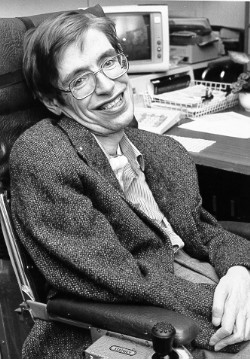From his wheelchair, Stephen Hawking explored the universe, touching people’s minds and inspiring them to explore the field of science.
At the University of Arizona, many students and professors in the astronomy and physics programs were inspired by Hawking, and were saddened to learn about the 76-year-old’s death.
“I was sad to hear about it,” said astronomy professor Phil Hinz. “I didn’t know what his health status was. He was someone who inspired me while growing up just reading his popular-level books.”
RELATED: UA Research travels to Capitol Hill
Charlotte Kevis, an astronomy and physics sophomore, was inspired to join the field because she grew up watching Hawking’s television series. She was shocked because his death was unexpected.
“He’s a total constant in this field, you just expect him to always be around,” Kevis said. “It’s just kind of insane, it’s just hard to think of.”
Overall, the reactions to his death were bittersweet, taking into account how long he lived with ALS, also known as Lou Gehrig’s disease.
“He exceeded expectations by about 50 years and survived much longer than he was anticipated to,” astronomy and physics senior Jonathan Schmid said. “In that time, he was married, he loved, he laughed; he contributed to society in a way that most people will never be able to dream of contributing to society.”
When Hawking was diagnosed with ALS in 1963, he was given only a few years to live. ALS is a rare neurological disease that is caused by the gradual death of motor neurons. Without those neurons, muscles cannot be used, which causes them to weaken and eventually atrophy.
Even though the disease left him only able to move his eyes and flex his finger, he became a leader in black hole and gravity exploration. He also led a full personal life, marrying twice, having three children and writing best-selling novels including “A Brief History of Time: From the Big Bang to Black Holes.”
Hawking’s successes while living with ALS inspired students, as well.
“I’ve gone through a lot of struggles in my life, not physically but mentally, and I saw him as a huge inspiration: If he can do it, then I can,” said John Doorley, a sophomore studying physics, astronomy and biology.
Doorley also hopes that Hawking will continue to inspire more people to get into physics and science.
RELATED: Q&A: UA Faculty Highlight: 2018 TED Fellow Dr. Burçin Mutlu-Pakdil
“I’m thankful… that he lived a lot longer than people said he was supposed to,” said astronomy and physics senior Nicole Zawadzki. “Indirectly, what he brought to the community and what he was able to discover is part of what I love about physics and astronomy; that everything that he’s done and shown us about the universe is very cool and made me want to continue learning about it.”
Professors like Hinz planned to begin class with a discussion about Hawking, and students will continue to learn from what Hawking contributed to science.
“While we’ll miss him and the contributions he’s made to humanity and science in general, I can’t regret the passing of a life well lived,” Schmid said.
Follow Rocky Baier on Twitter









